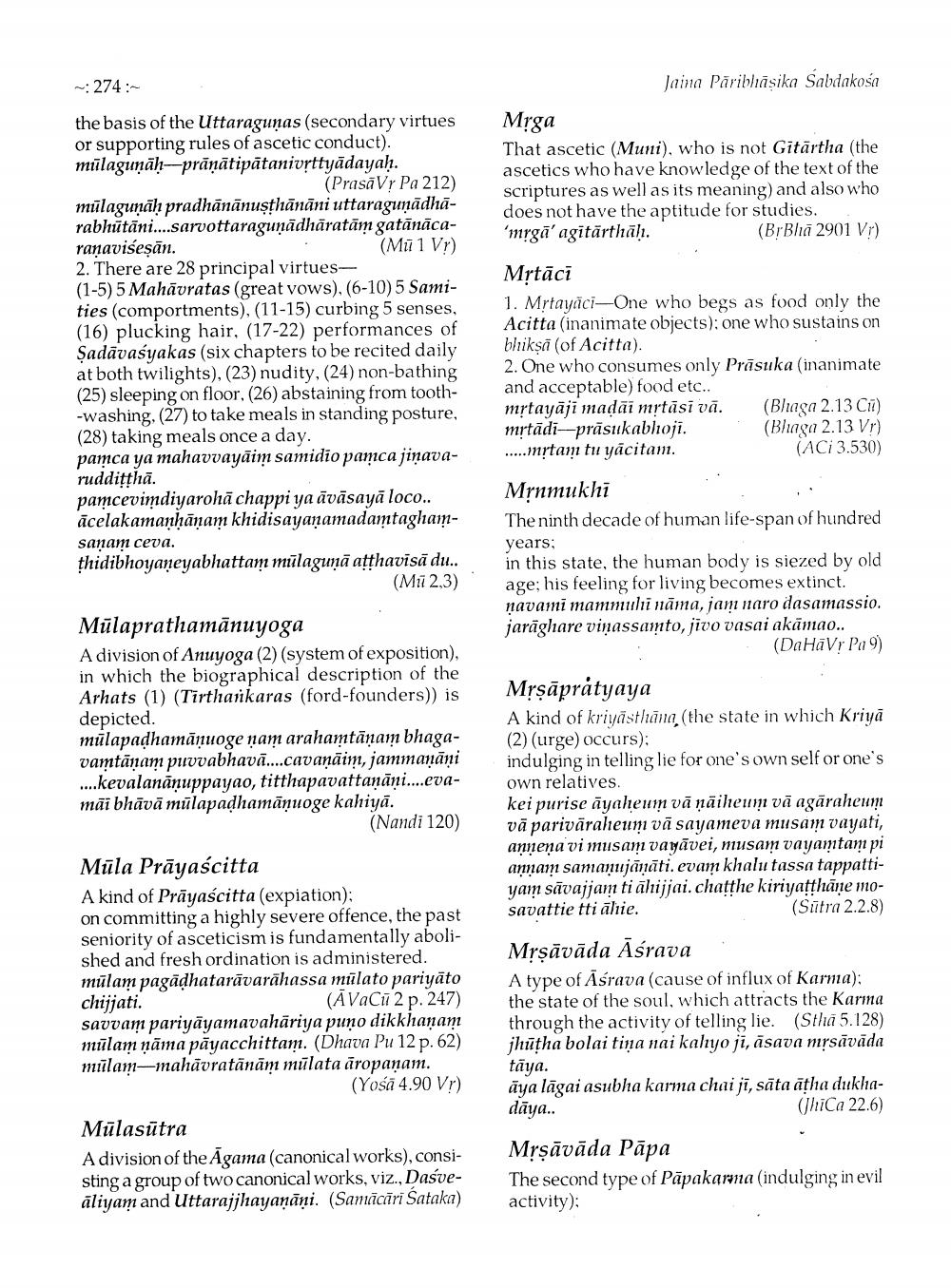________________
-:274:
Jaina Pāribhāsika Sabdakosa Mrga That ascetic (Muni), who is not Gitärtha (the ascetics who have knowledge of the text of the scriptures as well as its meaning) and also who does not have the aptitude for studies. 'mrgā' agitārthāh.
(BrBha 2901 Vr)
the basis of the Uttaraguņas (secondary virtues or supporting rules of ascetic conduct). mülaguņāh--prāņātipātanivettyädayah.
(Prasă Vr Pa 212) mülaguņāh pradhānānusthānāni uttaraguņādhārabhūtāni....sarvottaraguņādhāratām gatānācaranaviseşān.
(Mū 1 Vr) 2. There are 28 principal virtues(1-5) 5 Mahāvratas (great vows). (6-10) 5 Samities (comportments), (11-15) curbing 5 senses, (16) plucking hair, (17-22) performances of Şadāvasyakas (six chapters to be recited daily at both twilights), (23) nudity, (24) non-bathing (25) sleeping on floor, (26) abstaining from tooth-washing, (27) to take meals in standing posture, (28) taking meals once a day. pamca ya mahavvayāim samidio pamca jinavarudditthā. pamcevimdiyarohā chappi ya āvāsayā loco.. ācelakamanhānam khidisayanamadamtaghamsaņam ceva. thidibhoyaneyabhattam mülagunā atphavisā du..
(Mū2,3)
Mrtāci 1. Mrtayāci-One who begs as food only the Acitta (inanimate objects): one who sustains on bhikṣā (of Acitta). 2. One who consumes only Prāsuka (inanimate and acceptable) food etc.. mrtayāji madai mrtāsi vā. (Bhaga 2.13 C) mrtādi-prāsukabloji. (Blaga 2.13 Vr) .....Instam tu yācitam.
(ACi 3.530) Mrnmukhi The ninth decade of human life-span of hundred years; in this state, the human body is siezed by old age; his feeling for living becomes extinct. navami mammulināma, jam naro dasamassio. jarāghare vinassamto, jivo vasai akāmao..
(Da Hāli Pa9)
Mūlaprathamānuyoga A division of Anuyoga (2) (system of exposition), in which the biographical description of the Arhats (1) (Tirtharikaras (ford-founders)) is depicted. mülapadhamānuoge nam arahamtānam bhagavamtānam puvvabhavā....cavaņāim, jammanāni ....kevalanāņuppayao, titthapavattanāni....evamāi bhāvā mūlapadhamāņuoge kahiyā.
(Nandi 120)
Mrşāpratyaya A kind of kriyāstháng (the state in which Kriya (2)(urge) occurs); indulging in telling lie for one's own self or one's own relatives. kei purise āyaheum vāņāiheu vā agāraheum vä pariväraheum vā sayameva musam vayati, anneņa vi musam vayāvei, musam vayamtam pi annam samanujānāti. evam khalu tassa tappattiyam sāvajjam tiālijjai. chatthe kiriyatthäne mosacattie tti alie.
(Sutra 2.2.8)
Müla Prāyaścitta A kind of Prāyaścitta (expiation); on committing a highly severe offence, the past seniority of asceticism is fundamentally abolished and fresh ordination is administered. mülam pagādhatarāvarāhassa mülato pariyāto chijjati.
(ĀVaCu 2 p. 247) savvam pariyāyamavahāriya puņo dikkhanam mūlam ņāma pāyacchittam. (Dhava Pu 12 p. 62) mulam-mahāvratānām mūlata āropaņam.
(Yośā 4.90 Vr)
Mrşāvāda Āśrava A type of Aśrava (cause of influx of Karma); the state of the soul, which attracts the Karma through the activity of telling lie. (Stha 5.128) jhūtha bolai tina nai kalyo ji, āsava mrsāvāda tāya. āya lāgai asubha karma chai ji, sāta ātha dukhadāya..
(Thica 22.6)
Mülasūtra A division of the Agama (canonical works), consisting a group of two canonical works, viz., Dasvealiyam and Uttarajjhayanāni. (Samācāri Sataka)
Mrşāvāda Pāpa The second type of Pāpakarma (indulging in evil activity);




